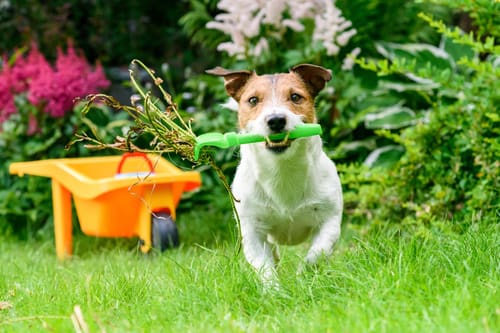Plant Toxicity in Dogs: Plants To Keep Your Dog Away From
Dogs are naturally curious, and that curiosity often leads them to sniff, chew, and even ingest plants around the home or yard. While some greenery is harmless, many common plants can be toxic to dogs, causing a range of health issues from mild stomach upset to severe poisoning. As a responsible pet owner, knowing which plants pose a risk to your furry friend can help you create a safer environment for them. Below, we’ll dive into the dangers of plant toxicity in dogs, highlight some of the most toxic plants, and discuss what to do if your dog ingests a harmful plant.

Houseplants That Are Toxic to Dogs
Many pet owners love having houseplants to brighten up their living spaces, but not all plants are safe for dogs. Several popular indoor plants contain toxins that can cause serious health issues if ingested.
Lilies
Lilies are highly toxic to cats, but they can also pose a risk to dogs. While dogs typically experience milder symptoms than cats, ingestion can still lead to gastrointestinal distress, lethargy, and irregular heartbeat. Peace lilies, calla lilies, and lily of the valley are among the most dangerous varieties for dogs.
Pothos (Devil’s Ivy)
Pothos is a popular low-maintenance houseplant, but its leaves contain calcium oxalate crystals that can cause severe mouth irritation, excessive drooling, vomiting, and difficulty swallowing in dogs.
Aloe Vera
While aloe vera is often used for its soothing properties in human skincare, it can be dangerous for dogs. The latex found in aloe leaves contains compounds that may cause vomiting, diarrhea, and changes in urine color.
Dieffenbachia (Dumb Cane)
Dieffenbachia is a beautiful indoor plant, but its sap can cause painful irritation in a dog’s mouth, leading to swelling, difficulty breathing, and excessive drooling.
Toxic Outdoor Plants Found in Gardens and Yards
Many outdoor plants commonly found in gardens and landscapes are toxic to dogs. Even a small nibble can lead to severe poisoning, making it essential to recognize and avoid these dangerous plants.
Azaleas and Rhododendrons
These flowering shrubs contain grayanotoxins, which can affect a dog’s cardiovascular and nervous systems. Symptoms of poisoning include vomiting, diarrhea, weakness, drooling, and potentially fatal heart issues if large quantities are consumed.
Sago Palm
The sago palm is a popular ornamental plant, but every part of it—especially the seeds—is highly toxic to dogs. Ingestion can cause severe liver damage, leading to vomiting, seizures, and even death.
Oleander
Oleander is a beautiful but highly poisonous plant that affects a dog’s heart. Even a small amount can cause vomiting, drooling, an irregular heartbeat, and life-threatening cardiac issues.
Foxglove
Foxglove contains cardiac glycosides, which can interfere with a dog’s heart function. Symptoms of ingestion include vomiting, diarrhea, drooling, weakness, and abnormal heart rhythms.
Poisonous Weeds and Wild Plants
While cultivated plants can pose a risk, wild plants and weeds can also be hazardous. When taking your dog for walks, be mindful of these toxic plants commonly found in parks and wooded areas.
Jimsonweed (Datura)
Jimsonweed contains toxic alkaloids that can cause confusion, hallucinations, tremors, and seizures in dogs. Even small amounts can be dangerous.
Poison Hemlock
Often mistaken for harmless wildflowers, poison hemlock is deadly if ingested. Symptoms include drooling, tremors, weakness, and respiratory failure.
Nightshade
Nightshade plants, including deadly nightshade and bittersweet nightshade, contain solanine, which can cause vomiting, diarrhea, confusion, and even paralysis.
What To Do If Your Dog Ingests a Toxic Plant
If you suspect your dog has eaten a toxic plant, take immediate action. Even if symptoms haven’t appeared, prompt intervention can prevent serious health complications.
- Identify the Plant: Try to determine what plant your dog ingested. If possible, take a sample or a photo to show your veterinarian.
- Contact Your Veterinarian: Call Broad Ripple Animal Clinic at (317) 257-5334 for guidance. Describe your dog’s symptoms and provide information about the plant ingested. Your vet may instruct you to bring your dog in for evaluation and treatment.
- Avoid Home Remedies: It’s essential not to induce vomiting unless explicitly directed by a veterinarian. Some toxic plants can cause further damage if regurgitated. Seeking professional care is the safest course of action.
Creating a Dog-Safe Environment
Protecting your dog from toxic plants requires proactive measures. Here are some steps to create a safer environment:
- Opt for non-toxic plants such as spider plants, areca palms, and Boston ferns to decorate your home.
- If you have toxic plants in your yard, consider using barriers to keep your dog away from them.
- Keep an eye on your dog when they’re exploring new areas, especially on walks or in unfamiliar yards.
- Make sure everyone in your household knows which plants are toxic to dogs and how to respond in case of ingestion.
How Broad Ripple Animal Clinic Can Help
Plant toxicity in dogs can be life-threatening, but knowing which plants to avoid and what to do in an emergency can make all the difference. If you suspect your dog has ingested a toxic plant, call Broad Ripple Animal Clinic at (317) 257-5334 for expert veterinary care. Your pet’s safety is our priority, and we’re here to help with any concerns regarding plant toxicity in dogs.
Recent Posts
About Us
Your pet is unique, unconditionally loving, and a valued part of your family, and Broad Ripple Animal Clinic recognizes the incredible bond you share. You can rely on our veterinarians and staff in Indianapolis, IN to be here for you, and be deeply committed to providing the highest level of care each time you visit. This includes giving you a central voice in the care of your pet and making you an integral part of the decision-making process.
Our AAHA-accredited animal hospital delivers a full spectrum of services, advanced technology, comprehensive pain management, and regenerative therapies to promote better healing.
